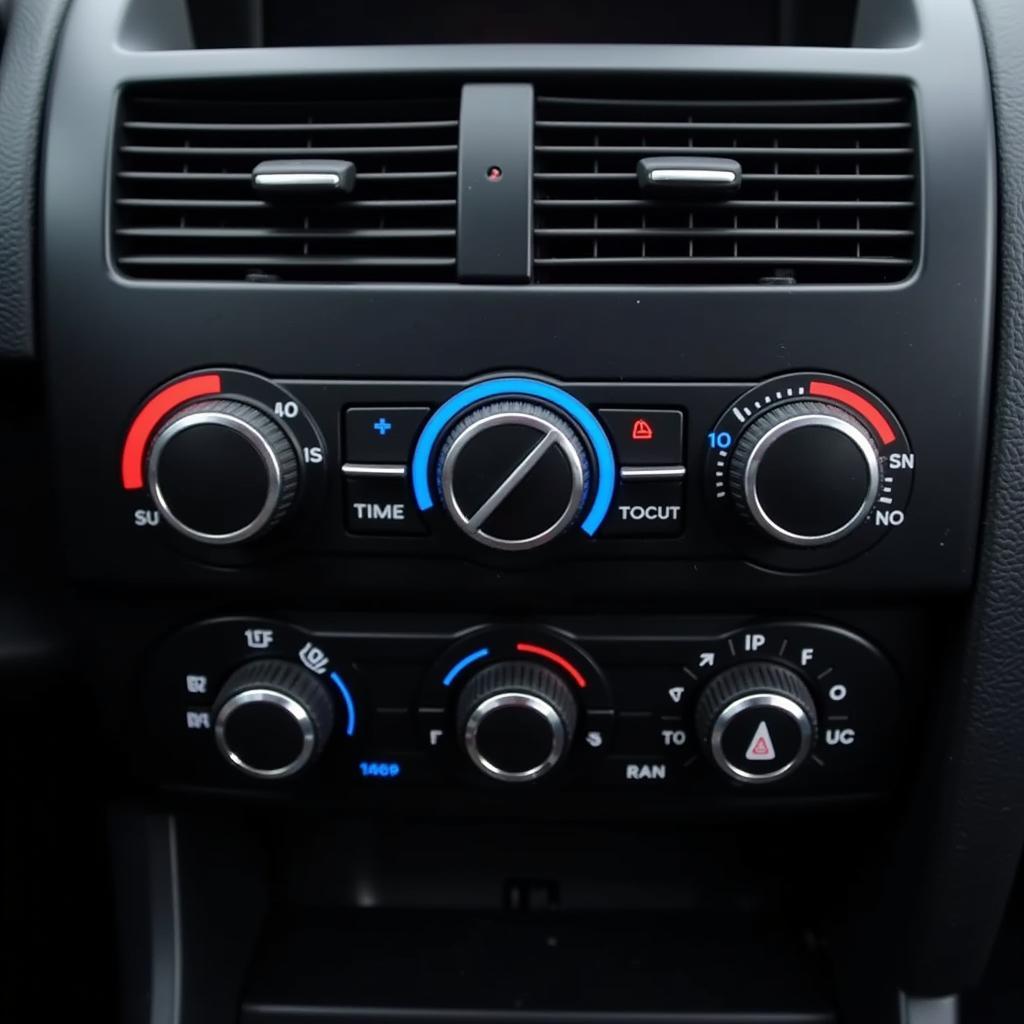Experiencing issues with your car’s air conditioner dials? This is a common problem that can quickly escalate from a minor inconvenience to a costly repair. Understanding the factors influencing repair costs and potential solutions can help you make informed decisions about your car’s AC system.
Decoding the Air Conditioner Dial System
 Car Air Conditioner Dials
Car Air Conditioner Dials
Your car’s air conditioning system relies on a complex network of components working in harmony. The dials you interact with are the control center, sending signals to various parts responsible for cooling and circulating air. These components include:
- Blower Motor: This motor pushes air through the vents, its speed dictated by the fan speed dial.
- Compressor: The heart of the system, the compressor pressurizes and circulates refrigerant, which absorbs heat from the cabin air.
- Condenser: Located at the front of your vehicle, the condenser cools the refrigerant, changing it from a gas to a liquid.
- Evaporator: Positioned inside the dashboard, the evaporator converts the liquid refrigerant back into a gas, absorbing heat from the cabin air in the process.
- AC Control Module: This electronic module receives signals from your dials and commands the other components to achieve your desired temperature and airflow.
Common AC Dial Problems and Their Associated Costs
When your AC dials malfunction, it disrupts the communication between your commands and the system’s response. Here are common issues:
- Broken Dials: Physical damage from wear and tear, accidents, or spills can render dials inoperable. Replacement costs vary depending on the car model and dial complexity but typically range from $50 to $200 per dial, plus labor.
- Electrical Faults: Wiring issues, blown fuses, or a malfunctioning AC control module can disrupt signal transmission. Diagnosing electrical problems can be complex, costing between $100 to $250. Repair costs vary greatly depending on the component and its accessibility.
- Vacuum Leaks: Some older vehicles utilize vacuum-operated controls. Leaks in the vacuum system can disrupt dial functionality and require specialized repair.
“Diagnosing AC issues early is crucial. Ignoring seemingly minor problems like a faulty dial can lead to more extensive and expensive damage down the line,” advises Mark Stevenson, a senior automotive electrician with over 20 years of experience.
Troubleshooting AC Dial Issues
Before heading to a mechanic, try these troubleshooting steps:
- Check the Fuses: Locate your car’s fuse box (refer to your owner’s manual) and check the fuses related to the AC system. Replace any blown fuses.
- Inspect for Visible Damage: Carefully examine the dials and surrounding areas for any cracks, loose connections, or debris that might be hindering movement.
- Test the Blower Motor: If the fan speed dial doesn’t respond, the blower motor itself might be faulty.
If these steps don’t resolve the issue, it’s best to consult a qualified mechanic specializing in automotive air conditioning systems.
Factors Affecting Air Conditioner Dial Repair Costs
Several factors beyond the specific dial problem can influence the overall repair cost:
- Car Make and Model: Luxury and imported vehicles often have more sophisticated AC systems and specialized parts, leading to higher repair costs.
- Labor Rates: Mechanic labor rates vary depending on location, experience, and shop reputation.
- Parts Availability: Readily available parts translate to quicker and less expensive repairs. Older or rare car models might require sourcing parts, potentially increasing costs and repair time.
“Don’t hesitate to get multiple quotes from different mechanics before committing to a repair. Transparency in pricing is key to avoiding unexpected surprises,” recommends Stevenson.
Preventing Future AC Dial Problems
- Regular Maintenance: Include AC system checks during routine car maintenance.
- Gentle Handling: Avoid forceful or rough use of the dials.
- Keep it Clean: Regularly clean the dashboard and control panel to prevent dust and debris accumulation.
Conclusion
Experiencing issues with your car’s air conditioner dials? Understanding the potential causes and associated repair costs empowers you to make informed decisions about your car’s AC system. While some troubleshooting steps can be taken at home, seeking professional help from a qualified mechanic ensures accurate diagnosis and effective repair.
Need help with your car’s AC system? Contact AutoTipPro at +1 (641) 206-8880 or visit our office at 500 N St Mary’s St, San Antonio, TX 78205, United States. We’re here to help you stay cool on the road!
Frequently Asked Questions
- Can I drive my car with a broken AC dial? While not mechanically detrimental, a broken dial can impact your comfort and potentially signal a larger issue with the AC system.
- How often should I service my car’s AC system? It’s recommended to have your AC system inspected annually or every 15,000 miles.
- Can I recharge my car’s AC myself? Recharging the AC system requires specialized equipment and knowledge. It’s best left to professionals.
- Why is my AC blowing hot air even after a recharge? This could indicate a leak in the system, a faulty compressor, or other component failure.
- How long does it take to replace an AC control module? Depending on the car model and accessibility, replacing the AC control module can take anywhere from a few hours to a full day.






Leave a Reply